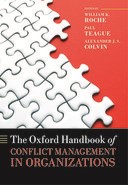 The Oxford Handbook of Conflict Management in Organizations
The Oxford Handbook of Conflict Management in Organizations
Contents
-
-
-
-
-
-
-
-
Perspectives on Conflict Perspectives on Conflict
-
The Institutional Sources of Conflict The Institutional Sources of Conflict
-
Institutional Variation in Conflict Institutional Variation in Conflict
-
A Brief Modern History of Conflict: Strike Activity (in Particular) Since World War II A Brief Modern History of Conflict: Strike Activity (in Particular) Since World War II
-
Whither Conflict? Whither Conflict?
-
Conclusions: Whither Conflict Management Systems? Conclusions: Whither Conflict Management Systems?
-
Notes Notes
-
References References
-
-
-
-
-
-
-
-
-
-
-
-
2 Labor-Managment conflict: Where it Comes From, Why it Varies, and What it Means for Conflict Management Systems
Get accessJohn Godard is Professor in the School of Business at the University of Manitoba, and Chief Editor of the British Journal of Industrial Relations. His work has generally focused on the associations between national institutional environments, employer practices, and both union and worker outcomes, although he has also published a number of papers on labor law and strike activity. His work has appeared mainly in the British Journal of Industrial Relations, Industrial and Labor Relations Review, and Industrial Relations.
-
Published:03 March 2014
Cite
Abstract
This chapter begins with a brief review of various perspectives on workplace conflict. It then turns to the development of an institutional conflict perspective, first identifying systematic sources of conflict within (and attributable to) capitalism and the capitalist employment relation, then extending this perspective to include sources of variation in conflict within capitalism. This perspective is in turn drawn on to account for variation in conflict since World War II, with a particular focus on strike activity, where it has gone, and what the implications may be for conflict management systems. The chapter concludes by arguing that the true management of conflict is a matter of institutional design, under which workers are provided with strong rights and protections, and a meaningful power balance is achieved at both the organizational and national levels.
Sign in
Personal account
- Sign in with email/username & password
- Get email alerts
- Save searches
- Purchase content
- Activate your purchase/trial code
- Add your ORCID iD
Purchase
Our books are available by subscription or purchase to libraries and institutions.
Purchasing information| Month: | Total Views: |
|---|---|
| October 2022 | 10 |
| November 2022 | 5 |
| December 2022 | 2 |
| January 2023 | 3 |
| February 2023 | 1 |
| March 2023 | 8 |
| April 2023 | 6 |
| May 2023 | 1 |
| June 2023 | 6 |
| July 2023 | 9 |
| August 2023 | 1 |
| September 2023 | 6 |
| October 2023 | 4 |
| February 2024 | 1 |
| March 2024 | 5 |
| April 2024 | 5 |
| May 2024 | 5 |
| July 2024 | 5 |
| September 2024 | 6 |
| October 2024 | 16 |
| November 2024 | 5 |
| December 2024 | 1 |
| January 2025 | 2 |
| February 2025 | 4 |
| March 2025 | 5 |
| April 2025 | 2 |

Get help with access
Institutional access
Access to content on Oxford Academic is often provided through institutional subscriptions and purchases. If you are a member of an institution with an active account, you may be able to access content in one of the following ways:
IP based access
Typically, access is provided across an institutional network to a range of IP addresses. This authentication occurs automatically, and it is not possible to sign out of an IP authenticated account.
Sign in through your institution
Choose this option to get remote access when outside your institution. Shibboleth/Open Athens technology is used to provide single sign-on between your institution’s website and Oxford Academic.
If your institution is not listed or you cannot sign in to your institution’s website, please contact your librarian or administrator.
Sign in with a library card
Enter your library card number to sign in. If you cannot sign in, please contact your librarian.
Society Members
Society member access to a journal is achieved in one of the following ways:
Sign in through society site
Many societies offer single sign-on between the society website and Oxford Academic. If you see ‘Sign in through society site’ in the sign in pane within a journal:
If you do not have a society account or have forgotten your username or password, please contact your society.
Sign in using a personal account
Some societies use Oxford Academic personal accounts to provide access to their members. See below.
Personal account
A personal account can be used to get email alerts, save searches, purchase content, and activate subscriptions.
Some societies use Oxford Academic personal accounts to provide access to their members.
Viewing your signed in accounts
Click the account icon in the top right to:
Signed in but can't access content
Oxford Academic is home to a wide variety of products. The institutional subscription may not cover the content that you are trying to access. If you believe you should have access to that content, please contact your librarian.
Institutional account management
For librarians and administrators, your personal account also provides access to institutional account management. Here you will find options to view and activate subscriptions, manage institutional settings and access options, access usage statistics, and more.